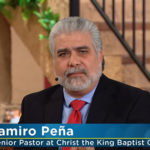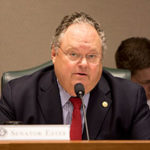How would you feel if your pastor knew how much you contribute to your congregation?
It’s a divisive topic. People get touchy about religion and about money. So, when you combine money and religion, the sparks often fly. But you can be sure the burden of congregational contributions weighs on many pastors’ minds in December. Churches not only wait on Christmas, but also on finding out if year-end gifts will be sufficient to meet the annual budget.
 Editor Marv KnoxIn the latest edition of The Christian Century, Dave Davis, a pastor from New Jersey, presents the case in favor of pastoral knowledge.
Editor Marv KnoxIn the latest edition of The Christian Century, Dave Davis, a pastor from New Jersey, presents the case in favor of pastoral knowledge.
“Ministers need to understand the financial reports better than anyone else around the table,” Davis insists. “Does understanding a congregation’s finances include knowing how much each congregant gives?”
Ministers are “split down the middle” on that question, he speculates. After almost four decades working closely with Baptist pastors, my guess is most would prefer not to know.
Pastors who take this position generally offer three reasons: (A) They don’t want their knowledge of giving to influence the quality of pastoral care. (B) They don’t want to be accused of favoritism. And (C) they don’t want church members to feel they think “too much” about money.
To be sure, knowledge of congregational contributions can’t help but play on the knower’s mind. My wife formerly served as a church financial secretary. We scrupulously avoided talking about the specifics of her job, and she never spoke of anyone’s giving. But I could read her agitation when some members yammered about the budget in church conference. Conversely, I also understood when she admired other quiet, little-known members. Joanna has vowed she never would serve as financial secretary in her own church again. “Knowing is too much,” she explains.
A case for knowing
Still, Davis makes a case for why pastors should know how much congregants give. He cites three basic reasons
Sign up for our weekly edition and get all our headlines in your inbox on Thursdays
First, the pastor can pay closer attention to members’ spiritual health. “One of my colleagues … compared not knowing to a doctor not knowing a patient’s blood pressure,” he explains. That’s a great point. Gratitude, generosity, commitment and obedience—all reflected in faithful giving and particularly tithing-plus-giving—are strong elements of spiritual vitality. If a pastor is missing this important information, understanding members well is impossible.
Second, the pastor can offer timely and effective care to church members in need. Davis lists several family crises—from the burden of college tuition, to job loss, to marriage failure—for which declining contributions provide an early indicator. “I believe that I ministered more sensitively because I was aware of these financial changes in the givers’ lives,” he explains.
Third, intimate knowledge of congregational giving enables the pastor to provide strong leadership as the congregation faces financial challenge. For example, knowing key givers are aging and understanding patterns of pledging enabled Davis to “help shape the conversation” about the church’s finances and members’ stewardship, he notes.
Gentle accountability
A fourth reason for pastoral knowledge mirrors the first. A pastor who knows members’ giving history can hold them accountable. This must be done gently, with love and respect, and accountability should be implemented for spiritual growth, not punishment or shame. But accountability provides a key ingredient of discipleship and maturity.
Some who argue against pastors knowing giving history cite Jesus: “But when you give to the needy, do not let your left hand know what your right hand is doing, so that your giving may be in secret. Then your Father, who sees what is done in secret, will reward you” (Matthew 6:3-4). However, that admonition is to the giver, not to others. Biblical support for knowledge comes from the practice of the early church itself, such as the fraud of Ananias and Sapphira (Acts 5:1-11).
Pastoral knowledge of members’ contributions will remain sensitive as long as people care about money—until hell freezes over. Financial knowledge can have a corrosive effect if it is not handled with grace, respect, integrity and love. But many churches—and members themselves—would be better off if pastors know how much members are giving. And if members know pastors know.















We seek to connect God’s story and God’s people around the world. To learn more about God’s story, click here.
Send comments and feedback to Eric Black, our editor. For comments to be published, please specify “letter to the editor.” Maximum length for publication is 300 words.